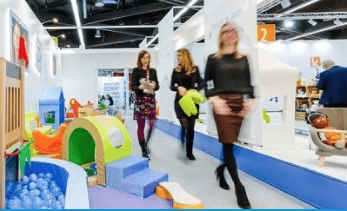Every year, a new crop of tradeshows appears on our newsletters and calendars, and retailers must weigh the costs and benefits of attending, deciding which shows and exhibits are must-sees and which ones they can afford to skip. Each tradeshow varies in scope and target demographic, so it’s important to know what you want to get out of any given trade show before deciding to attend.
There are several other factors—like budgeting for your hotel and transportation expenses and managing your store while you’re away, for example—to consider leading up to the event. While preparing for large industry events might be stressful, we’ve gathered a few tips from trade show veterans to help attendees maximize their time at upcoming industry events.
- Make travel and hotel reservations early to maximize on discounted rates. Many shows have event dates posted and registration open almost a year in advance.
- Determine your primary, secondary, and tertiary goals you want to achieve by attending an event. Are you going to the trade show to learn more about marketing, to make contacts, or to check out latest trends for your inventory?
- Develop a list of “must see” and “want to see” exhibitors, speakers, and events. At a big show, you won’t be able to interact with everyone, so find out which vendors and industry contacts are most important for you to meet.
- If you are travelling with colleagues, split sessions to maximize data gathering.
- Make appointments with exhibitors with whom you really want to network.
- Pack for comfort. Have comfortable shoes and clothing. Veteran trade show attendees have measured that they walk an average of 10-12 miles at major shows in Atlanta, Orlando, and Las Vegas.
- Bring your own “carry-all” bag for materials you’ll accumulate at the convention center. Complimentary plastic bags are often uncomfortable, as they cut into your hands and make them sweat. If you’re networking, you’ll be shaking lots of hands, and nobody likes a clammy hand for a first impression.
- If available to you, bring your own branded gear. While people expect tradeshow booths to give away swag, you can advertise your brand with a branded shirt, custom pens, or other promotional products.
- Tell exhibitors you are on a tight schedule to avoid small talk and get straight to business.
- Look for networking opportunities. Introduce yourself to people around you—at workshops, receptions, wherever—hand and collect plenty of business cards and social media contacts.
- Be prepared to push for answers to questions that exhibitors are not prepared to answer.
- Skip overly crowded booths and plan to come at the end of the day when traffic is slower.
After the show, set out a plan for implementing the information you’ve gathered. Organize and keep in touch with the contacts you’ve gathered, whether it means following up with a manufacturer to buy their products for your store or liking them on Facebook to stay in contact. Of course, these are only guidelines for preparation. Of course, these are only guidelines. Be sure to create your own checklist, tailored specifically to what your need company needs.
